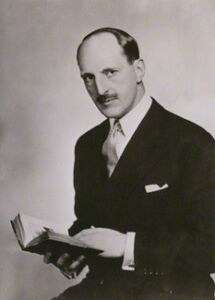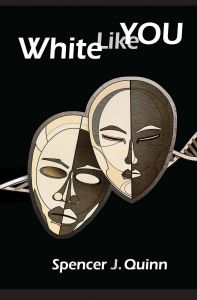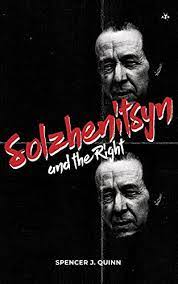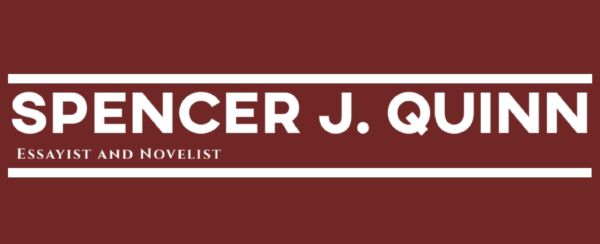The Littlest Red Pill: Archibald Ramsay’s The Nameless War

Archibald Ramsay in 1937. (Image source: Wikipedia)
2,896 words
Everyone loves a good conspiracy theory.
If it is plausible and helps explains something a person knows to be true but cannot prove, then it provides comfort. It makes the truth seem less daunting. It also helps if the theory is entertaining. Sometimes conspiracy theories are correct, sometimes only partially so, and sometimes — maybe most of the time — not at all. The centuries-old conspiracy theory positing that the Jews are behind the destruction of Christian Europe is a combination of all three as packaged in an essential little volume entitled The Nameless War by Archibald Ramsay. Aside from its explosive content, what’s most interesting about this book is that it dispenses red pills of the highest dosage, but in such tiny capsules. The work’s brevity gives it the impression of being a beginner course on the Jewish Question, when in truth it is anything but.
Ramsay was a staunch Right-wing member of the British Parliament from 1931 until his arrest and imprisonment on trumped-up charges in May 1940 under Defence Regulation 18B, which allowed the British government to detain and imprison without trial anyone suspected of harboring pro-German sentiments (Sir Oswald Mosley and other members of the British Union of Fascists were likewise detained under this legislation). During the buildup to the Second World War, Ramsay became more and more convinced that not only were the Jews behind the belligerence toward Nazi Germany, they were also behind all of the most destructive European revolutions for the previous 300 years. In The Nameless War, written in 1952 — eight years after his release from prison — Ramsay endeavored to reveal the truth behind this vast conspiracy theory. Just as importantly, he argued for Nazi Germany’s innocence — as well as his own — in the face of all the accusations leveled against them.
Ramsay is a clear and engaging writer, but hardly a historian. His chapters on the twentieth century, especially those dealing with events of the late 1930s, are his strongest and mark a valuable contribution to dissident literature. More on these later. The early chapters dealing with the Jewish hand behind Oliver Cromwell’s interregnum, the Glorious Revolution, and the French Revolution, however, are brief and less convincing. Like any good conspiracy theorist, Ramsay reports rumors, hearsay, and difficult-to-verify facts and then encourages the reader to connect the dots. He may be right or wrong — and probably closer to right than wrong in many cases — but it is difficult to put faith an author who produces scanty evidence to support a bold claim while not protecting himself against counter-argument. That is one of the main differences between a historian and a polemicist, and sadly, the further back in time he goes, the more Archibald Ramsay seems like a polemicist.

You can buy Spencer Quinn’s novel White Like You here.
In the first ten paragraphs of The Nameless War, Ramsay outlines the Jews’ nefarious plans after being banished from England in 1290. He adduces a letter written to the Rabbi of Arles in Provence, France in 1489 from Constantinople by someone named V.S.S.V.F.F., Prince of the Jews. According to Ramsay, this princely person “advised the Jews of Europe to adopt the tactics of the Trojan Horse; to make their sons Christian priests, lawyers, doctors, etc., and work to destroy the Christian structure from within.”
That’s it. This is all that Ramsay offers to explain why the Jews prompted the Spanish Inquisition and later subverted England through “their creature and hireling,” Oliver Cromwell. The source for this? The letter was apparently published in 1889 in James de Rothschild’s newspaper Revue des estudes Juives. While I could find a handful of sources online reprinting the letter, I could not find any references to the actual, physical letter itself — at least not in English. Did it ever even exist? Another wrinkle not mentioned by Ramsay is that this letter suggests that Jews retaliate to similar gentile threats. For example:
2. As for what you say about their making attempts on your lives: make your sons doctors and apothecaries, that they may take away Christians’ lives.
3. As for what you say of their destroying your synagogues: make your sons canons and clerics in order that they may destroy their churches.
So, leaving aside the innumerable verities and falsities of history, Ramsay’s own source could be used against him. It would have been nice had Ramsay included this nugget of information as a sign of his good faith. That he didn’t is a strike against him, unfortunately.
As for Cromwell, Ramsay is on much firmer ground since he cites several sources and names names. He forwards the claims made in the Jewish Encyclopedia and other sources that the Jews Manassa Ben Israel and Fernandez Carvajal funded Cromwell and his New Model Army, respectively. That Jews were officially admitted into England under Cromwell after over 350 years of exile is well known. Ramsay also mentions the fact that in 1921, two letters were unearthed that confirmed beyond any doubt Cromwell’s paid service to the Jews, and how this resulted directly in the assassination of King Charles I, and later, the admission of Jews into England. A conspiracy, if you will. But here at least Ramsay offers a real source: the September 3, 1921 issue of a newspaper called Plain English, edited by onetime Oscar Wilde lover Lord Alfred Douglas. These letters may or may not be hoaxes, but at least Ramsay does his due diligence as a reporter.
Ramsay also implies that Jewish intrigue was the primary reason for Cromwell’s belated Jewish welcome into England. Maybe not. Paul Johnson in his A History of the Jews writes about how many of the Puritan opponents of the Crown at the time believed that the End Times would not happen unless the Biblical prophecy of the Jews being scattered across the Earth was first fulfilled. This apparently gave many Englishmen a reason for accepting Jews back into their country. Thus, maybe it wasn’t just about blood money. Maybe it wasn’t only because of Cromwell and the Jews. Who knows? This is the kind of historical messiness that conspiracy theorists tend to eschew, and Ramsay is no exception. And yes, Johnson was a philo-Semite, but that doesn’t mean he is wrong in this instance.
Ramsay’s French Revolution chapter is in equal parts compelling and iffy. Firstly, he uncritically cites The Protocols of the Elders of Zion to demonstrate the way in which the disastrous results of the Revolution coincided neatly with the insidious aims expressed by the purported Hebraic authors of that mysterious document. Well, okay. But I know that even as far back as 1952, the origin of The Protocols was hotly disputed, with many claiming it was an elaborate forgery. This was well known in Ramsay’s day. The very least he should have done was alert his readers to this controversy rather than rely on their general ignorance to get his points across. Even better would have been an effort to show how the Protocols were not a cribbed version Maurice Joly’s 1864 pamphlet describing Napoleon III’s ambitions to control the world after all.
We don’t get that. So another strike against Ramsay.
Regardless, he covers the French Revolution well enough. He describes how France had fallen into debt to Jews and how issuing money on the security of precious metals rather than land worked against the interests of France. He cites various sources, including Sir Walter Scott’s Life of Napoleon, describing how Jews financed the Revolution behind the scenes. Jews also pulled strings behind the Illuminati and the Freemasons, which sowed the seeds for revolution among the French public throughout the 1780s. Then, of course, there was Jewish control of the press, which issued calumny and propaganda to discredit the French Crown — most famously in the instance of Marie Antoinette, when she was falsely reported as having ordered an extremely expensive diamond necklace while the populace was starving. All this, along with a few convenient deaths — or well-timed murders — of key players in the French government led to the Revolution and all the horrors which followed.
Toward the end of the chapter, Ramsay quotes G. J. Renier, the seemingly philo-Semitic author of a Robespierre biography, who quotes his subject in one of his final speeches:
“I dare not name them at this moment and in this place. I cannot bring myself entirely to tear asunder the veil that covers this profound mystery of iniquity. But I can affirm most positively that among the authors of this plot are the agents of that system of corruption and extravagance, the most powerful of all the means invented by foreigners for the undoing of the Republic; I mean the impure apostles of atheism, and the immorality that is at is base.”
Mr. Renier continues with all a Jew’s satisfaction: “Had he not spoken these words he might still have triumphed!”
In this smug sentence Mr. Renier unwittingly dots the i’s and crosses the t’s, which Robespierre had left uncompleted. Robespierre’s allusion to the “corrupting and secret foreigners” was getting altogether too near the mark; a little more and the full truth would be out.
At 2 a.m., that night Robespierre was shot in the jaw and early on the following day dragged to the guillotine.
Again let us recall Protocol 15 . . .
This could all be speculation or fantasy; then again, perhaps not. Simon Schama suggests the gunshot to Robespierre’s jaw may have been a botched suicide. (Yes, Schama is Jewish, but again, that doesn’t necessarily mean he’s wrong in this instance.) Regardless, even if Ramsay’s information is not always reliable and his methods not always rigorous, a pattern of Jews seeking gain through the violent usurpation of established gentile hierarchies is beginning to emerge. Could there be something to it?

You can buy Spencer J. Quinn’s Solzhenitsyn and the Right here.
Once we get into the twentieth century, The Nameless War gains its footing. They say “write what you know,” and Archibald Ramsay certainly knew the twentieth century. In his brief treatise one can find hints of Aleksandr Solzhenitsyn, David Hoggan, Elmer Barnes, Francis Parker Yockey, and a number of other leading lights of the Right. As with his previous chapters, he’s light on sources and evidence, but in this case it’s all right. I’ve read enough dissident material about the Russian Revolution and the Second World War to vouch for much of what comes next.
In his chapter on the Russian Revolution of 1917, he’s right when he claims that the Jew Jacob Schiff financed the Bolsheviks as well as the Japanese in their 1905 war against Russia. He’s right about the high proportion of Bolsheviks being Jews. He quotes several sources, including the April 1919 British White Paper on Bolshevism as well as a few Jewish sources, all effectively saying the same thing: that the most destructive force the civilized world had ever seen since the days of Genghis Kahn was disproportionately the handiwork of Jews. As is his wont, Ramsay continues to ignore possible counter-argument and skepticism. The conspiratorial thinking is still there. But with the sins of Soviets so grotesque and enormous, the reader begins to realize that even if Ramsay’s assertions were only half-right, he’d still have a powerful point.
Next comes Ramsay’s ardent defense of Adolf Hitler and Germany — although oddly, not of Nazism or fascism. As expected, he quotes Mein Kampf at length. His effusive praise of Hitler might be a little on the shameless side, but it’s not wrong. As a world leader, Hitler understood the Jewish Question better than anyone. He also cared for the German people and did his best to peacefully undo the wrongs of the Treaty of Versailles, all the while encouraging Jewish ethnocentrism in their own homeland. It was Bolshevik-aligned international Jewry which brought the war to him.
Never before in history had any country not only repulsed organized revolution, but discerned Jewry behind it, and faced up to that fact. We need not wonder that the sewers of Jewish vituperation were flooded over these men and their leader; nor should we make the mistake of supposing that Jewry would stick at any lie to deter honest men everywhere from making a thorough investigation of the facts for themselves.
Ramsay then discusses events that are common knowledge among many dissidents today about Germany, England, the United States, and the build-up to the Second World War:
- That Hitler had always proposed peace and friendship with the British Empire.
- That Hitler deliberately spared the British forces at Dunkirk.
- That powerful Jews such as Samule Untermeyer waged economic warfare against Germany throughout the Great Depression.
- That the anti-German language of warmongering Jews during this time was apocalyptic and unrelenting.
- That Jews had found their way to positions of great influence in the major nations of the world at that time.
- That the British offered a secret guarantee — known then as the “blank check” — to Poland months before the war, promising that they would support Poland in the event of German aggression.
- That Poland provoked Germany’s invasion by abusing its German minority, economically threatening the Free City of Danzig, and making numerous incursions into German territory.
- That England and France would not have adopted a belligerent attitude towards Germany if not for “constant needling from Washington.”
- That Franklin Delano Roosevelt’s 1940 campaign promises of neutrality were lies, given the American convoys of supplies and ammunition being sent to the Allied nations and the Lend-Lease Act.
- That Roosevelt deliberately goaded Japan into war.
The Nameless War wouldn’t be The Nameless War without conspiratorial thinking, even in its best chapters. Ramsay claims with little evidence that the Jews were behind Neville Chamberlain’s fall from power after the Munich conference in 1938. He also blames the Treaty of Versailles on the Jews since, presumably, the secretaries of all the world leaders in attendance were Jews, and their bosses didn’t know how to read maps:
It is known the Mr. Lloyd George and others were hazy about geography. Their Jewish secretaries, however, were on the contrary very much on the spot on such matters. These Jews met at 6 p.m. in the evenings; and mapped out the decision for the following day’s conference of the “Big Four.”
At one point, he includes a personal anecdote in which he approached a “very wealthy and patriotic peer, the head of a great business” to ask for funding to publish The Nameless War. The man, who remains nameless, refused, citing his certainty that the Jews would ruin him if he were to try. A compelling story, no doubt, but impossible to verify.
Ramsay also gets a few things wrong. Aside from obvious mistakes such as claiming that Abraham Lincoln’s assassin, John Wilkes Booth, was Jewish and uncritically reprinting the Franklin Prophecy — the hoax which purported that Benjamin Franklin wanted to keep Jews out of the nascent United States — Ramsay claims that Neville Chamberlain was sincerely opposed to civilian bombing during the war. Thanks to Jewish political pressure, he was replaced by Winston Churchill, who wasn’t. David Hoggan in The Forced War demonstrates, however, that Chamberlain and Lord Halifax had been planning the bombing of German cities for at least a year prior to the outbreak of war, and only appeared to appease Hitler at Munich because they felt that Britain was not yet ready for a fight with Germany.
Ramsay also never has anything positive to say about Jews. Their skill in business, medicine, science, music, chess — none of that seems to matter to him. This was one of the more charming aspects of Solzhenitsyn’s Two Hundred Years Together: He presented the truth about Jews, both good and bad. Ramsay almost never offers cover for innocent Jews, which is something that Kevin MacDonald does in the Introduction to The Culture of Critique. With Ramsay, it’s all Jews, all the time, and aside from one sentence in The Nameless War, it’s all bad.
This is too bad. The Nameless War contains a lot of crucial information. That this information often appears alongside a nearly equal amount of fanciful or unverifiable information makes the work easier for the skeptic or the uninformed to dismiss. Ramsay should have understood this and done the legwork ahead of time to prevent this from happening. Regardless, Ramsay has one thing going for him as an author: a seemingly instinctual loathing of Bolshevism and a crystal-clear recognition of its grave dangers. He’s also fearless when it comes to pursuing the truth behind it all. This should endear him to anyone on the Right and makes the chapter in which he exonerates himself from the bogus charges leveled against him especially compelling.
So what if he fudges things a little bit? What’s a little untethered propaganda between friends, am I right? What difference does it make if he can’t tell good evidence from bad? Who cares if he has a weakness for conspiracy theories? I mean, we all wanna believe, don’t we? Let’s be honest. Plus, Archibald Ramsay, unfairly persecuted historical figure that he was, meant well, and that’s what counts.
Then again, when you look at all the untethered propaganda Jews have been leveling at whites for the past 150 years, perhaps Archibald Ramsay and The Nameless War deserve a second look.
Now that I think about it, forget about everything critical I wrote in this review. The Nameless War is a great book. Perfect, even. Buy it now. Read it. Memorize it. The conspiracy is real. Ignore it at your peril. Don’t listen to anyone who tells you different. Every word in this fantastic little tome is true, I swear to God.




